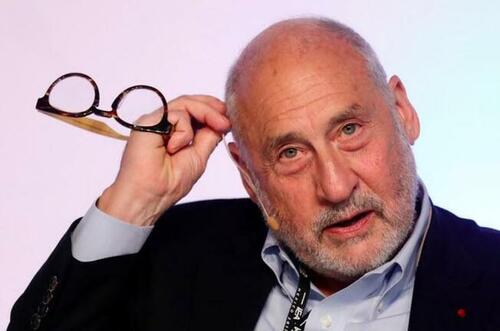Joseph Stiglitz On The Minimum Wage: A Disgrace
Submitted by Walter E. Block, Harold E. Wirth Eminent Scholar Endowed Chair and Professor of Economics at Loyola University
In his 1993 introductory economic textbook, Economics, Columbia University economics professor Joseph Stiglitz gives the usual dismal science analysis of minimum wage legislation: it creates unemployment for those least likely to be able to bear it: unskilled workers whose productivity is below the level stipulated by law. It hurts the very people who, ostensibly, this enactment was meant to help.
In his own words, from this textbook:
“Price floors have predictable effects too…. If government attempts to raise the minimum wage higher than the equilibrium wage, the demand for workers will be reduced and the supply increased. There will be an excess supply of labor. Of course, those who are lucky enough to get a job will be better off at the higher wage than at the market equilibrium wage; but there are others, who might have been employed at the lower market equilibrium wage, who cannot find employment and are worse off.”
All well and good you say? Not so, very much not so. For this 2001 Nobel Prize winning economist has also come out in favor not for the elimination of this pernicious legislation, nor, even, to leave it alone and hope that inflation can reduce its real value (thus unemploying fewer unskilled workers), but for an increase in the level mandated.
Specifically, he called for a boost in the federal minimum wage from $7.25 to $10.10 per hour.
Talk about cognitive dissonance.
If there were a Nobel Prize for that, Stiglitz would surely win it. You can’t get too much further apart from what this world-famous economist wrote in his textbook and what he calls for in the real world.
How does Stiglitz reconcile his support of the minimum wage law with his textbook’s denigration of this enactment? That, indeed, is the $64,000 question.
One possibility is that various economists such as David Card and Alan Krueger have failed to discern any unemployment effects for low wage employees upon an increase in the minimum wage. But that hardly supports Professor Stiglitz’s textbook treatment of this law. What can we say in behalf of the wisdom his textbook seeks to impart to undergraduate students? The answer would be that Card and Krueger and their ilk should dig deeper; and/or not confine themselves to slight increases in this legislation. Rather they should compare states of the world where it exists at something like $7.25 per hours at today’s prices with its utter and total absence.
Another ploy sometimes used by supposed economic sophisticates is the argument from monopsony. No, that is not a mis-spelling of monopoly, sometimes characterized as a single seller of a good or service. Monopsony, in sharp contrast, is a single buyer of an item, for example, in this case, labor. The argument from monopsony is the answer to this attempted reductio ad absurdum against the minimum wage law: if it is so great, why not raise it to $1,000,000 per hour, and then we would all be rich? To the extent there is monopsony in the economy, there are strict limits as to how high the minimum may go, before negatively and heavily impacting the labor force via unemployment. Yes to $15 per hour, and, maybe, even $25 per hour, but certainly not to anything very much higher than that; certainly not to anything like millions of dollars hourly.
But the big problem with this argument is that monopsony, if it exists at all, must necessarily be limited to cases where one or at most a very few firms (oligopsony) hire a certain type of laborer. Possible examples include professional baseball, football, basketball and hockey stars, engineers, chemists, physicists, computer nerds, movie stars, rock musicians, etc. Does this sound like workers who earn in the realm of the minimum wage? Of course not. Thus, this argument too, fails.
We are left with a big mystery: how can a public figure like Joseph Stiglitz get away with the public embarrassment of blatantly contradicting himself? At the very least, he ought to repudiate what he wrote in his textbook, if he keeps on supporting the minimum wage law. Or, far better yet, he should cease and desist from his present advocacy of this pernicious legislation
(On a personal note, the value of my Ph.D. degree from Columbia University in 1972 has taken a hit thanks to this man occupying a prominent professorial role there).
Tyler Durden
Mon, 06/06/2022 – 19:00
via ZeroHedge News https://ift.tt/bjFtQZz Tyler Durden
